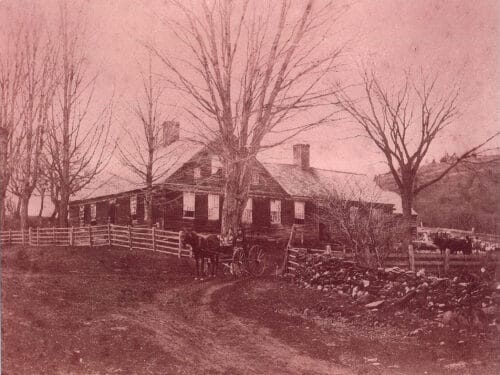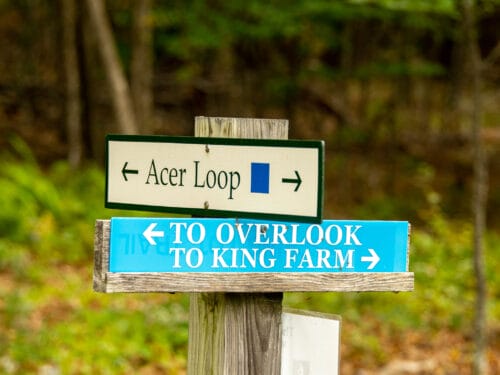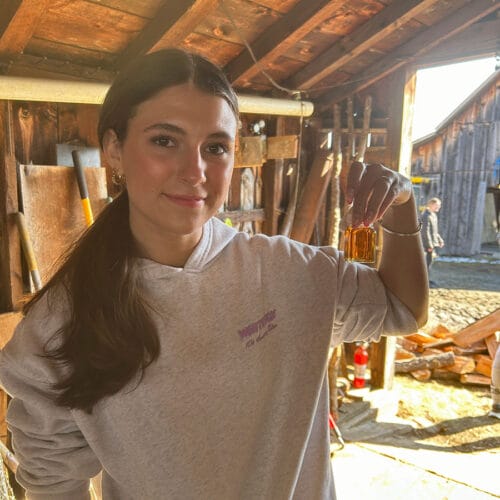Nearly 40 years in, King Farm in Woodstock continues to evolve
5 min read / September 9, 2024
Can't find what you're looking for? Please contact us.
5 min read / September 9, 2024
As a state-wide land trust now in its 47th year, our approach to conservation has evolved. The early decades laid a foundation that continues today – protecting lands from development using conservation easements. Grounded in that bedrock, and as our stewardship obligations have grown, we have deepened relationships with landowners, and started investing in restoration of watersheds and forests to foster resilience in the landscape.
We’re also taking a broader view of who we serve and who benefits from conservation. In addition to the landowners and community organizations who protect land, Vermont’s wider community and visitors enjoy the benefits of vibrant food systems, ecological health, and places open for recreation and nature exploration. Today, we’re aiming to expand who benefits even further.
One way we’re doing that is by investing in lands we own. This could be through trails, education, community gardens, and more.

King Farm’s farmstead dates back to 1793.
We’re pouring some of this energy into King Farm in Woodstock. Donated to us in 1986 by Francisca King Thomas, fourth-generation owner, this 154-acre parcel features woodlands, pasture, and trails adjacent to the Marsh-Billings-Rockefeller National Historical Park. It was Francisca’s wish that we permanently own and manage the land for agriculture, forestry, and public education.
King Farm was our first home, while we were still the Ottauquechee Regional Land Trust and later as we became the Vermont Land Trust, bringing conservation to the entire state. It continues to house one of our regional offices today, along with the Two Rivers-Ottauquechee Regional Commission.
Nearly 40 years later, Francisca’s vision is generating new excitement as we collaborate with local organizations to deepen community and student engagement at King Farm.

Trails on the Woodstock, Vermont property take visitors seamlessly into the neighboring Marsh-Billings-Rockefeller National Historical Park.
Francisca’s vision for the land as a place to connect with Vermont’s rural history and landscape has endured. Farm tenants have raised horses, cattle, and sheep. With its rolling pastures, upland forests, and sweeping views of the Ottauquechee Valley, the farm has long been a place to walk, hike, observe farm life and nature, and cross-country ski.
King Farm’s relationship with the local community is longstanding, too: SculptureFest brings outdoor artwork every year, and Sustainable Woodstock hosts community gardens at the homestead.
Our land stewardship at the farm has made it a demonstration site for educational events on a range of topics, including invasive species management, in cooperation with the neighboring National Park, the Natural Resources Conservation Service, and Redstart Consulting of Corinth, Vermont.
But King Farm’s youngest stewards have emerged as the strongest voice for its future – an evolution that feels fitting, given Francisca’s focus on education.

Students from the local high school come to King Farm to apply what they learn about farming, forestry, and caring for the land.
High school students in Woodstock Union High School’s CRAFT (Community and Climate Resilience through Agriculture, Forestry, and Technology) program spend time on the farm, studying natural processes, sugaring, and testing out land management approaches.
Students recently met with representatives of the American Chestnut Foundation about how to help restore the tree to its native range in Vermont. They discussed their findings with VLT’s Forest Program Director, Pieter van Loon, to determine where to plant the trees at the farm and how to protect them from deer.
Students are also exploring ways to improve food security for their neighbors, using King Farm’s farmland and infrastructure and working with local organizations. The farm has become a place where students can apply what they learn and test ideas.
Kat Robbins, teacher and co-developer of CRAFT, said it’s important students have the chance to practice land stewardship in a place that feels safe and supported. “It gives them the confidence and skills to be effective stewards wherever they land after high school,” she said.
The school’s 16-year relationship with VLT has evolved into a close partnership that feels reciprocal and collaborative, she added.
For the past 12 months, we’ve been meeting regularly with leaders from the Mountain Views Supervisory Union, serving more than seven towns in the Upper Valley, and other community members to explore the possibilities for King Farm. Our goal is to create a regional hub, connected to the National Park, for learners of any age to deepen their connection to land.
This spring we hired engineering consultants to perform a site assessment. We’re now evaluating potential community uses and the improvements needed to make those possible. This could include renovating historic buildings, improving parking and access, and creating gathering spaces. (The original farmhouse was built in 1793. The main barn, sheep barn, granary, and ash house are nearly as old.)
“There are so many inspiring ideas really grounded in connecting people to this place,” Kat said.
Once a shared vision emerges, we’ll develop a multi-year fundraising campaign to turn it into reality.
“Access and connection to land is important, but most of us don’t live on farms or work our own woodlots,” said VLT’s Dan Kilborn. “People connect to the land in many ways, and when VLT owns land we can support those connections directly. Whether it’s providing access to trails and water, community garden space, or educational programs, we strive to make VLT lands inclusive and accessible for all.”
Whatever King Farm’s future holds, we are committed to honoring our mission – and Francisca’s legacy – to foster the community’s connection to the land.
Pieter leads our forest program, providing a forestry perspective for conservation project design, advising on forest management of conserved lands, helping to manage lands we own, and contributing to education and outreach efforts about Vermont’s woods and how we can care for them. Before starting with VLT in 2000, Pieter was a consulting forester in southern VT. He most enjoys being out in the woods with people and helping them see and understand their surroundings in new ways. Pieter enjoys photography, birding, and biking around the home he and his wife, Rachel, built in Marlboro and takes every chance he can get to visit his kids and grandkids in Philadelphia and northern California.
EmailAs our Lands Director, Dan helps to manage land we own throughout the state. For many years, Dan served as a VLT forester in northern Vermont. Prior to joining VLT in 2007, Dan was a consulting forester in northern Vermont and New Hampshire. He enjoys exploring the connections between people and land, especially people’s relationship with our forests and how it influences the decisions we make. Off the job, Dan enjoys canoeing, hiking, hunting, birding, and helping to manage his family’s woodland.
EmailPieter leads our forest program, providing a forestry perspective for conservation project design, advising on forest management of conserved lands, helping to manage lands we own, and contributing to education and outreach efforts about Vermont’s woods and how we can care for them. Before starting with VLT in 2000, Pieter was a consulting forester in southern VT. He most enjoys being out in the woods with people and helping them see and understand their surroundings in new ways. Pieter enjoys photography, birding, and biking around the home he and his wife, Rachel, built in Marlboro and takes every chance he can get to visit his kids and grandkids in Philadelphia and northern California.
EmailAs our Lands Director, Dan helps to manage land we own throughout the state. For many years, Dan served as a VLT forester in northern Vermont. Prior to joining VLT in 2007, Dan was a consulting forester in northern Vermont and New Hampshire. He enjoys exploring the connections between people and land, especially people’s relationship with our forests and how it influences the decisions we make. Off the job, Dan enjoys canoeing, hiking, hunting, birding, and helping to manage his family’s woodland.
Email